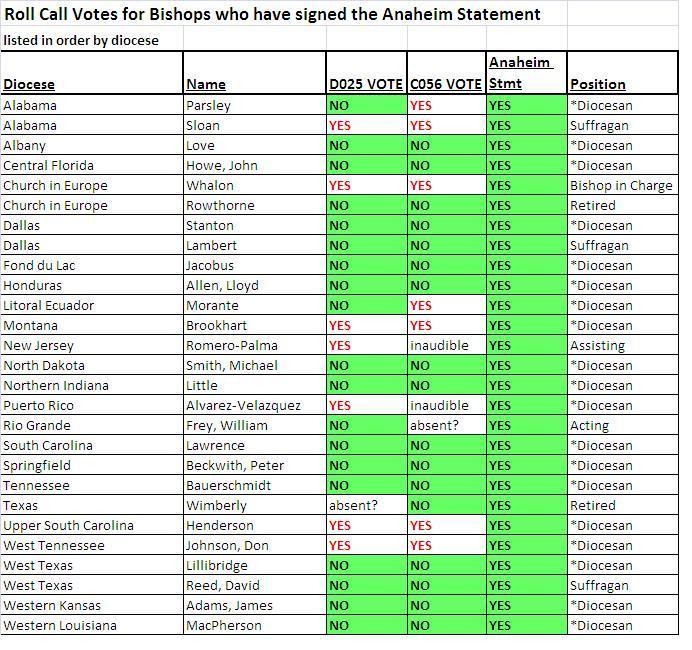I honestly cannot remember a time in my life in the Episcopal Church where I have read more mistakes in less time than in the last two to three weeks. Please do not believe everything you read and make sure to fact check and research material, a point we have stressed time and again on this blog.
A case in point is this recent piece by Diana Butler Bass. I enjoyed Dr. Bass’ Standing Against the Whirlwind : Evangelical Episcopalians in Nineteenth-Century America which was well written and researched (and is quite relevant to our present time by the way), and so was baffled to see such a poorly written piece by her on Beliefnet.
The relevant section of her article for our purposes reads this way:
The Anglican Church of North America, the umbrella group for conservative Episcopalians who have left their denomination over women’s ordination and full inclusion of gay and lesbian persons, has long claimed over 100,000 members. Recently, they admitted that only 69,000 persons in 650 churches in the USA and Canada have joined their association. There are 2.2 million Episcopalians in the United States and approximately 1 million in Canada. Thus, the conservative group–the one that has garnered so much media attention in recent years is a very small percentage of the entire North American Anglican membership–some 2% of the total. And with their rigid opposition to women’s ordination, it is hard to imagine that this group will find much appeal with young North Americans.
Now for the record, I am not in ACNA. Certainly her description of the reason for the departure of ACNA is not one ACNA would agree with just for starters. It is over issues of Christology, marriage, the authority and interpretation of Scripture, the nature of the church, and the standards of Christian leadership that this controversy is fundamentally about.
According to ACNA’s own website, ACNA still claims 100, 000 members. That claim has not changed. The reference to the 69,000 number is for Average Sunday attendance: according to the ACNA site ACNA claims “average Sunday attendance of 69,197 (as of spring 2009)” [and there is a even more about ACNA numbers here]. So follow along. Dr. Bass suggests the claim of membership in ACNA has changed. It hasn’t. Then she suggests ACNA is claiming a number for membership which ACNA is claiming for average Sunday attendance. This is elementary category confusion. As anyone in parish ministry knows membership and Sunday morning attendance are very different.
Having made all these errors, Dr. Bass then compares the wrong category of numbers for ACNA and TEC and the Anglican Church of Canada:
There are 2.2 million Episcopalians in the United States and approximately 1 million in Canada. Thus, the conservative group–the one that has garnered so much media attention in recent years is a very small percentage of the entire North American Anglican membership–some 2% of the total.
Do you see how she got the 2% figure? She took the roughly 69,000 figure, which is for Average Sunday attendance, and compared it to the membership figures for TEC and the Anglican Church of Canada. But this is comparing apples to oranges. The Episcopal Church has not been using average Sunday attendance figures for all that long, but you may know that whereas in the 2004 tables TEC claimed ASA of 833,672, by the 2009 tables that number is down to 768,476.
The 1 million number Dr. Bass gives for the Anglican Church of Canada membership is way off. One of the recent numbers I found was 641,845, but of course, this is again membership not Sunday morning attendance. I would honestly be surprised if average Sunday attendance in the Anglican Church of Canada is more than 200,000 actually (many of you know I lived and worshipped in Canada for two years), but let’s use 300,000 for our purposes.
Now, if you use these figures, and compare apples to apples, the ASA of ACNA is approximately 6.5% of the ASA of TEC and the Anglican Church of Canada combined, more than three times the percentage total Dr. Bass gives.
You would think given the large number of errors that I would be finished. But no. She continues:
And with their rigid opposition to women’s ordination, it is hard to imagine that this group will find much appeal with young North Americans.
Well, this would come as news to my friend Mary Hays, an ordained woman quite involved in ACNA, to pick just one example. ACNA is trying to protect two perspectives on women’s ordination, as anyone in the movement itself could have told Dr. Bass if she had asked.
What an embarrassing effort Dr. Bass has given us in this article. I sincerely hope she will improve in the future–and please, do not believe everything you read–KSH.


